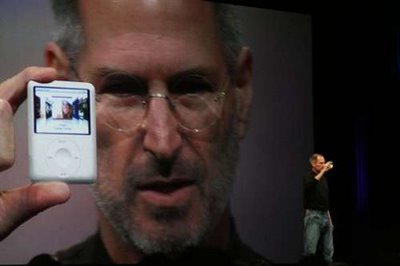
neat. Given that our Universe is also a dodacahedron, I think we can start to expect 12-sided dice to manifest with increasingly frequency as we approach the End Times.
(Seems I’ve been on quite a referential streak of late)

neat. Given that our Universe is also a dodacahedron, I think we can start to expect 12-sided dice to manifest with increasingly frequency as we approach the End Times.
(Seems I’ve been on quite a referential streak of late)
too good to pass up.


Fifty years from now people will look back and mark this date as the turning point when the shackles of 20th-century media and telephony and film and TV and print were thrown off, shrugged away like so much heavy useless armor. And you, Apple faithful, will tell your grandchildren that you were there to see it. You lined up at the Apple store on Day One, your hands trembling, and purchased this magnificent device and recognized, even then, that what you were touching was the future. You will tell how you were there on the day when freedom — yes! glorious freedom! — burst into the world like sunlight into a darkened cave. Freedom. Say it out loud. Freedom. What a word. What a concept. A new kind of freedom, the kind where you lock yourself into the world of an enlightened despot, the greatest figure of our age, the Walt Disney of the 21st century, and bask in the glory of what I give you. My freedom. My world. My greatness. Multitouch coupled to disk drive coupled to WiFi coupled to Safari coupled to OS X. Imagine it! Dream it! Then dare to do it!
Photos and text via Fake Steve, who just earned a slot in my RSS portfolio.
I don’t think Apple is doooomed (h/t to Brian for the meme) but it’s clear that Apple is losing some of its focus on what its users want in its drive to become a media company rather than a computer company. There’s a lengthy article over at Tech Digest that looks at the current Mac lineup (Mini, iMac, and Pro) and comes away unhappy with the lack of a suitable midrange option. And even the top-end Pro has woefully underpowered graphics in comparison to the rest of the field.
Of course, on the media company front, things aren’t all that rosy from userland either. With the introduction of the anticipated touchscreen Video iPod, Apple has cut the price on the high-end iPhone by a third – $200 (!). Woe unto the early adopters who were tempted by the Apple and adopted early. This is the sort of arseholeish behavior by Apple that makes me, someone who was waiting for exactly the phone-less iPhone device that the touchscreen iPod represents, extremely unlikely to go out on a limb and invest in one.
More and more, it seems like Apple is crafting a “experience” for its users, informing them of what they need and substituting style for substance. And treating it’s users like chumps in the process, under the (probably accurate) assumption that they will come crawling back for more. It’s ironic that Apple’s slogan used to be, “Think Different”. More and more, making the sizable investment in Apple’s hardware means quite the opposite. It isn’t quite Camazotz yet, but then again, everyone on the street does seem to be wearing white earbuds nowadays…
UPDATE: Fake Steve Jobs weighs in. Also, he’s got an extra-special offer for the early adopters of yesteryear.
UPDATE 2: don’t miss this column by Cringely. Excerpt:
Steve does things like this because he can. It reaffirms his iron grip over both Apple and Apple’s customers. It’s a lot about ego and a little about business, though with Steve Jobs they are hard to differentiate.
Here is something very important to remember about Steve Jobs (and probably the only part of this column that will bother him in the least): most of his business moves are still in reaction to having been fired by Apple back in 1985.
It’s a fascinating deconstruction of the whole pricing fiasco and the consequences. Bottom line: Apple milks $75 million extra profit out of its hard-core fanbase. What else are they good for, after all? Read the whole thing.
search is finally in Google Reader. Now you can find that that apricot recipe you came across a few months ago and now have a craving for. Or perhaps you’d like to search for “ipod” so that you can read at once all the posts in your subscriptions that mention today’s announcements.
Search lets you use keywords to find items in your subscriptions (if you’re looking to search all blogs, give Blog Search a try). If you subscribe to someone’s shared items, it’ll search those too.
OK, I’ve only been using Google Reader for two weeks, but the very first thing I noticed was the lack of a search function. It seems obvious that a Google service would have some sort of search capability, but it just wasn’t there. It’s a welcome feature addition, though now I’d like to see Reader add a storage quota and save headlines indefinitely like Gmail does (and allow users to pay for upgraded storage as they already do for Gmail and Picasa). Ultimately Reader should be integrated directly into Gmail with a unified interface.
What would be tremendously useful would be to make a given search public, and publish a RSS feed of its own. This could then be subscribed to like any other feed or fed in Yahoo Pipes, Twitter, or other APIs.
And while I’m wishing for ponies, can we also have a direct “Blog this” button for each headline, right next to “email this”, which integrates directly into Blogger and copies the tags over to the Labels?
I did a two-year stint at Lincoln Lab after college, and that was probably where I really learned how to code and surf *nix. One command I learned back then, that lives on to this day in every .alias file I ever keep handy in ~, was:
alias wax "rm -fR"
For those of you who know *nix, you will immediately recognize this as a Very Dangerous Tool. I have learned to wield wax very, very carefully – through (painful) experience.
I relate this anecdote to explain why the following sort of thing gives me the screaming heebie-jeebies:
Free, open source application Remove Empty Directories (RED) searches your computer for empty folders and deletes the ones you don’t want around anymore. Just point RED at the drive or directory you want to scan and it lists every empty folder in that directory. You can then either delete every empty folder or selectively protect the empty folders you don’t want to lose.
Sure, sure, it lists every folder first – but this is the kind of thing you never want to entrust to a script. File this under “hell no”-ware.
Today’s XKCD is for all the browncoats out there.
I love this joke. No fair googling the answer; leave your best guess in the comments.
For the record, I was telling this joke as far back as 1991.
As you may have noticed from my sidebar, I’ve recently joined Facebook. In a short time I’ve come to realize just how effective it is at managing your social relationships; I’ve also joined LinkedIn which is the professional equivalent. I find that the two services complement each other nicely rather than competing.
The great advantage of these services is that you create a walled garden for yourself and thus retain total control over your communication. Facebook provides extremely granular control over privacy on a per-contact basis so you really are able to fine-tune just who can contact you and who you want to stay in touch with.
Tangentially related to this is a recent dust-up between several high-profile “web 2.0” personalities that makes for interesting reading. It started with Robert Scoble, who created a three-part video essay provacatively titled “Why Mahalo, TechMeme, and Facebook are going to kick Google’s butt in four years“. Scoble is obsessed with the idea that search engine optimization (SEO) is poisoning the well of search and that adding the “social” element will magically improve relevance. Dave Winer had a fairly succinct rebuttal, Danny Sullivan took issue with Scoble’s explicit equating of SEO with spam, and Rand Fishkin steps through Scoble’s arguments and fact-checks it to oblivion.
Overall, I came away from the fracas convinced that social networking is not some magic bullet and the problems of “how do I find information” and “who do I want to interact with” to be wholly separate ones. I like a walled garden for my identity-driven personal and professional interactions, but I also want to wander in the wild when need be. It’s the same reason I am skeptical of “personalized search” services like Google’s own “Web History” initiative. It’s not the privacy issues that worry me, but rather the imposed limitation on what my search results are based on what my search results were in the past. Why should I assume that for a given search, the most relevant results will necessarily be related to the searches I previously made? Presumably I search for something based on a need for new information I do not currently possess.
If anything, the onus on the user is to craft a better query; to that end Google offers an advanced set of search operators that provide tremendous power and flexibility. Overall, every search is unique, and no amount of personalization or social networking is going to change that fact. If anything, the right approach is to allow a search to stimulate new searches; ie ask new questions rather than spoonfeed me old answers.
here. prepare for pain. The author claims there’s a unique solution. you’ve been warned.